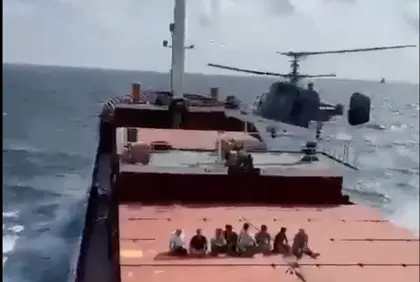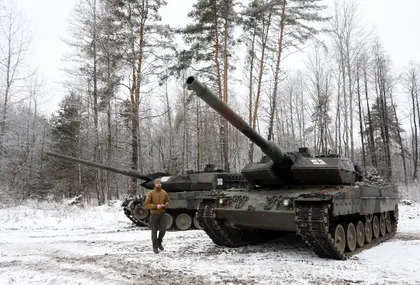Ukraine has branded an operation conducted by Russia’s armed forces in the Black Sea on Sunday an “act of piracy” and “clear violation of international law.”
What has Moscow done this time?
JOIN US ON TELEGRAM
Follow our coverage of the war on the @Kyivpost_official.
According to the Kremlin, a Russian warship fired warning shots at a cargo vessel heading towards the Ukrainian port of Izmail on Sunday.
The Russian defense ministry said the Vasily Bykov patrol ship spotted a cargo vessel sailing under the flag of Palau “en route to the Ukrainian port of Izmail.”
The captain of the Sukru Okan cargo ship did not respond to demands to stop for "the inspection for the transportation of prohibited goods.”
“To force the ship to stop, warning shots from automatic small arms were fired from a Russian warship,” the ministry said.
A helicopter carrying Russian military personnel was then scrambled to inspect the vessel, the statement said.
Did this actually happen?
Initially there was skepticism, with some outlets claiming the Russians were lying about the helicopter and subsequent inspection, instead claiming the ship’s crew had simply ignored calls to stop and then changed course slightly.
A video appearing to back up Moscow’s version of events then emerged, showing a Russian helicopter hovering above the Sukru Okan as Russian troops tried to clamber aboard after inspecting the vessel.

Russian Air Attack Kills Nine in Sumy Region
The video of how Russian marines landed today on the Palau-flagged #SukruOkan merchant vessel and almost crashed their helicopter. They landed on this vessel for a quick search after their patrol ship Vasily Bykov had fired automatic weapons. The incident happened in the Black… pic.twitter.com/7yG8UTDSKZ
— Viktor Kovalenko (@MrKovalenko) August 14, 2023
So Moscow wasn’t making it up?
It appears not, though they did miss out the bit shown in the above video when their helicopter very nearly crashed into the ship and was forced to fly off and make another attempt to pick up a couple of soldiers.
What has Ukraine said?
In a post on X (formerly Twitter) on Sunday evening, Mykhailo Podolyak, adviser to the Head of the President’s Office, condemned the “act of piracy” and called on the international community to recognize it as such.
“Today's deliberate attack and forced inspection by Russia of the Sukru Okan international civilian bulk carrier, which was en route to the Ukrainian port of Izmail, is a clear violation of international law of the sea, an act of piracy and a crime against civilian vessels of a third country in the waters of other states,” he said.
Referring to a document once used by belligerent states to authorize the use of private vessels as ships of war, he added: “This precedent with the attempt to introduce a ‘Letter of Marque and Reprisal’ requires clear legal fixation, identification of all persons and recognition of the fact of the crime by the international community.”
Today's deliberate attack and forced inspection by Russia of Sukru Okan international civilian bulk carrier, which was en route to the Ukrainian port of Izmail, is a clear violation of international law of the sea, an act of piracy and a crime against civilian vessels of a third…
— Михайло Подоляк (@Podolyak_M) August 13, 2023
Is he right?
Yes, unless Russia can prove the Sukru Okan was itself committing an act of piracy.
As the British Royal Yachting Association notes: “Vessels are free to navigate the High Seas within the laws of their Flag State and only a warship of their own nation has the right to intercept them (other than to confirm the nationality of the vessel) unless they are committing an international crime such as piracy.”
Has the international community responded?
No definitive response or statements have so far been issued but Turkey – a key player in the Black Sea grain deal – has said it is looking into it.
What’s the background to all this?
Since pulling out of the landmark Black Sea Grain deal in July, Russia has intensified attacks on facilities vital for Ukrainian grain shipments.
The deal had allowed around 33 million tons of grain to safely leave Ukrainian ports, easing fears of global food shortages.
With the Black Sea route effectively blocked, the formerly obscure Ukrainian ports of Izmail and Reni on the Danube have become crucial to the exports.
Russia is now targeting civilian ships under the pretense they could be used for military purposes.
Earlier this month, France accused the Kremlin of deliberately putting global food security at risk after Russian drones strikes destroyed almost 40,000 tons of grain in an overnight strike on southern Ukrainian ports.
You can also highlight the text and press Ctrl + Enter










